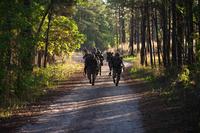Secretary Panetta told reporters Wednesday on the famous Doomsday Plane that America's combat role in Afghanistan could be over by next year. Then all hell broke loose.
Top lawmakers on Capitol Hill were caught completely off guard -- they began firing off announcements questioning or criticizing what appeared to be a new, earlier goal for a U.S. withdrawal. Headlines began to pop up all over the place: America Speeds Up Exit From Afghan War. Everyone wondered: What goes on here?
Panetta said later, and Pentagon spokesmen reiterated, that the 2013 timeline was aspirational, and that it was all within the structure of the existing American commitment to hand over control of the war by the end of 2014. We've got to start the transition sometime, DoD seemed to say, so we might as well start soon and hope that by next year, the Afghans will have taken charge of their own security.
That doesn't mean "combat" qua combat will stop, officials insisted. "No one in this Building and no one in the field is under any misapprehension here," said Navy Capt. John Kirby, a top Pentagon spokesman. There are years of hard fighting left in Afghanistan, he stressed, and he also reminded reporters Thursday that American troops would continue to serve in Afghanistan through 2014 in beyond, mostly in training and special operations roles.
The next big set of decisions about Afghanistan will be taken by NATO's heads of state, Kirby said, when they meet in May in Chicago. They'll determine timetables, structure of forces and goals for what a U.S. and NATO presence could look like after ISAF passes the baton of officialdom to the Afghan government.
The problem is that, by all accounts, the Afghan police and army are not ready to take the baton, nor would they be in a year or even two years. Although DoD keeps saying the Afghans are improving, there seems to be broad agreement that it'll be awhile before they can do much on their own. As Secretary Gates used to say, there are elements in Kabul that want the U.S. to stay forever.
So why did Panetta throw out the 2013 date? Here's one theory: He may have planned to pitch it to NATO allies during his meetings this week in Europe, so the various Euro-ministries could chew it over in time for their bosses' big confab this spring. Then, with ISAF's heads of state all sitting around one of those big tables in President Obama's home town, they could have made a global splash by announcing that the "combat" role would be over earlier than everyone expected. Brilliant!
Only Panetta spilled the beans Wednesday to his traveling press corps during the plane ride to Brussels. Maybe it was an accident -- he was apparently reading from his own notes and may have mistaken what was in the open and what wasn't. Or maybe he did it deliberately so that he could land in Belgium and make a big splash for the alliance, to be crystal clear about his intentions.
"[Panetta] will, with his defense colleagues, all of them together as defense ministers, will be making recommendations to the heads of state as we head towards the NATO summit in Chicago," State Department spokeswoman Victoria Nuland said Thursday. "You’ve heard the president say that the Chicago summit, we expect, will further elaborate the timetable between now and 2014. So that’s what the Secretary of Defense is out there working on with his NATO colleagues, and I’m going to let them speak to the details of that."
All good and well -- but, Nuland was asked, did anybody know Panetta would talk about 2013 before he did? Did State consult with the Afghans or the Europeans? The answer was apparently no, but Nuland again said there was nothing to see here:
"I think it’s fair to say we’ve been talking since Lisbon, since the target date was set, about how you get to the target," she said. "All of the elements that go into that, whether you’re talking about strengthening and supporting the Afghans as they transition, whether you’re talking about the training that goes into that, whether you’re talking about the rotation of allies and how they contribute ... and we had always said that we expected that the Chicago summit in May would put more benchmarks on the calendar. So it makes sense that in preparation for a summit, when ministers of defense are meeting three months ahead of a summit, that they would begin that conversation about what recommendations they might be able to make to heads, but decisions will be made at Chicago."
And there you have it. The next question is, did Panetta ask the Euro-allies about the 2013 timeline -- or did he tell them?








